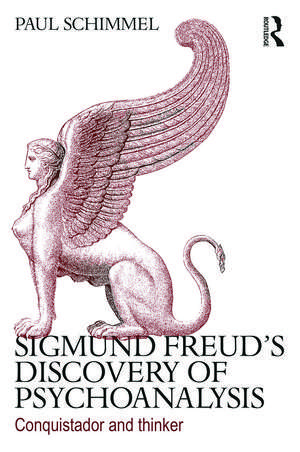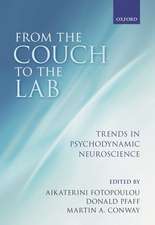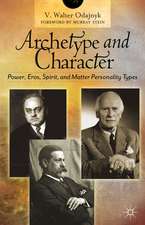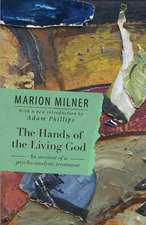Sigmund Freud's Discovery of Psychoanalysis: Conquistador and thinker
Autor Paul Schimmelen Limba Engleză Paperback – 23 sep 2013
In 1900 Freud wrote that he was ‘not a thinker’ but ‘a conquistador’. In reality he was both, and was engaged in a lifelong emotional struggle to bring these contradictory sides of his personality into relationship. His psychoanalytic discoveries are conceptualized in the context of his need to achieve integration within his psyche, and in particular to forge a more creative collaboration between ‘conquistador’ and ‘thinker’.
Sigmund Freud’s discovery of psychoanalysis will be of interest to psychoanalysts, psychoanalytic psychotherapists, academics and teachers of psychoanalysis, and to all serious students of the mind.
| Toate formatele și edițiile | Preț | Express |
|---|---|---|
| Paperback (1) | 375.25 lei 43-57 zile | |
| Taylor & Francis – 23 sep 2013 | 375.25 lei 43-57 zile | |
| Hardback (1) | 1408.45 lei 43-57 zile | |
| Taylor & Francis – 26 sep 2013 | 1408.45 lei 43-57 zile |
Preț: 375.25 lei
Preț vechi: 395.00 lei
-5% Nou
Puncte Express: 563
Preț estimativ în valută:
71.83€ • 78.05$ • 60.37£
71.83€ • 78.05$ • 60.37£
Carte tipărită la comandă
Livrare economică 21 aprilie-05 mai
Preluare comenzi: 021 569.72.76
Specificații
ISBN-13: 9780415635554
ISBN-10: 0415635551
Pagini: 176
Dimensiuni: 156 x 234 x 10 mm
Greutate: 0.27 kg
Ediția:New.
Editura: Taylor & Francis
Colecția Routledge
Locul publicării:Oxford, United Kingdom
ISBN-10: 0415635551
Pagini: 176
Dimensiuni: 156 x 234 x 10 mm
Greutate: 0.27 kg
Ediția:New.
Editura: Taylor & Francis
Colecția Routledge
Locul publicării:Oxford, United Kingdom
Public țintă
General, Postgraduate, Professional, and Professional Practice & DevelopmentCuprins
Acknowledgements. May 6th, 1895 (A Poem For Freud’s Birthday). Introduction. Conquistador and Scientist. Freud’s Hypnotic Trance.Through Suggestion to Free Association.Freud’s Brain and Freud’s Mind. The Dream of Irma’s Injection: Yet Another Interpretation.Seduction or Self-Analysis.From Melancholia to Mourning. Conclusion. Crossing The Alps (A Poem by Michael Harlow). Freud Bibliograpy. General Bibliography.
Recenzii
"Paul Schimmel, in this concise volume, explores a particular tension in Freud’s character and motivation between the ‘conquistador’ and the ‘thinker’ or man of science. A dialectical interplay between Freud’s impassioned drive for discovery alongside a rational, deductive capacity for revision and reformulation of ideas is traced through his major ideas, from the ‘Project’ through to ‘Analysis terminable and interminable’. His relationship with Fliess, studies with Charcot, self-analysis, dream of Irma’s injection and ideas on mourning are also illuminated by this perspective. A fascinating, humanising study." - Paul Williams, Training Analyst, British Psychoanalytical Society; Joint Editor-in-Chief, The International Journal of Psychoanalysis, 2001-2007
"Paul Schimmel's wide scholarship adds intriguing perspectives on how, with the gradual integration of Freud's passionate will to greatness and his contained, intuitive reflective capacity, came increased self awareness and the 'discovery' of the new universe of psychoanalysis, of the unconscious and transference." Frances Thomson-Salo, Associate Professor Training Analyst Australian Psychoanalytical Society, and Honorary Fellow, Department of Psychiatry, University of Melbourne
"Schimmel offers a reading of Freud that is found in Freud’s own words which adds an authenticity to his argument. He therefore has something important to say in the perennial question as to whether or not psychoanalysis is an art or ascience…This is a thoughtful, well-researched book, which deserves to be read and added to the canon of Freudian literature that takes us." – Alistair Ross, Oxford University, European Journal of Psychotherapy & Counselling
"History is defined in many ways by many people. In 1906 William Osler said, "History is simply the biography of the mind of man". The mind of man was deepened and we were given new ways to explore it by Freud. Keeping alive the spirit of open enquiry into the mind of man enriches all our lives. Paul Schimmel’s book makes a valuable contribution towards that ongoing study and I recommend this enjoyable and readable book." – Maurice Whelan, Australasian Journal of Psychotherapy
"To maximize one’s enrichment from Schimmel’s work one needs to have familiarity with the subject—experienced readers of Freud, psychology historians, scholars, and clinicians interested in theory are those who will be most rewarded by this well-written, compact, very full treatment of critical periods and issues in the life and thinking of the founder of psychoanalysis." – Thomas P. Kalman, Psychodynamic Psychiatry, March 2015
"Paul Schimmel, in this concise volume, explores a particular tension in Freud’s character and motivation between the ‘conquistador’ and the ‘thinker’ or man of science. A dialectical interplay between Freud’s impassioned drive for discovery alongside a rational, deductive capacity for revision and reformulation of ideas is traced through his major ideas, from the ‘Project’ through to ‘Analysis terminable and interminable’. His relationship with Fliess, studies with Charcot, self-analysis, dream of Irma’s injection and ideas on mourning are also illuminated by this perspective. A fascinating, humanising study." – Paul Williams, Training Analyst, British Psychoanalytical Society; Joint Editor-in-Chief, The International Journal of Psychoanalysis, 2001-2007
"Paul Schimmel's wide scholarship adds intriguing perspectives on how, with the gradual integration of Freud's passionate will to greatness and his contained, intuitive reflective capacity, came increased self awareness and the 'discovery' of the new universe of psychoanalysis, of the unconscious and transference." –Frances Thomson-Salo, Associate Professor Training Analyst Australian Psychoanalytical Society, and Honorary Fellow, Department of Psychiatry, University of Melbourne
"Paul Schimmel's wide scholarship adds intriguing perspectives on how, with the gradual integration of Freud's passionate will to greatness and his contained, intuitive reflective capacity, came increased self awareness and the 'discovery' of the new universe of psychoanalysis, of the unconscious and transference." Frances Thomson-Salo, Associate Professor Training Analyst Australian Psychoanalytical Society, and Honorary Fellow, Department of Psychiatry, University of Melbourne
"Schimmel offers a reading of Freud that is found in Freud’s own words which adds an authenticity to his argument. He therefore has something important to say in the perennial question as to whether or not psychoanalysis is an art or ascience…This is a thoughtful, well-researched book, which deserves to be read and added to the canon of Freudian literature that takes us." – Alistair Ross, Oxford University, European Journal of Psychotherapy & Counselling
"History is defined in many ways by many people. In 1906 William Osler said, "History is simply the biography of the mind of man". The mind of man was deepened and we were given new ways to explore it by Freud. Keeping alive the spirit of open enquiry into the mind of man enriches all our lives. Paul Schimmel’s book makes a valuable contribution towards that ongoing study and I recommend this enjoyable and readable book." – Maurice Whelan, Australasian Journal of Psychotherapy
"To maximize one’s enrichment from Schimmel’s work one needs to have familiarity with the subject—experienced readers of Freud, psychology historians, scholars, and clinicians interested in theory are those who will be most rewarded by this well-written, compact, very full treatment of critical periods and issues in the life and thinking of the founder of psychoanalysis." – Thomas P. Kalman, Psychodynamic Psychiatry, March 2015
"Paul Schimmel, in this concise volume, explores a particular tension in Freud’s character and motivation between the ‘conquistador’ and the ‘thinker’ or man of science. A dialectical interplay between Freud’s impassioned drive for discovery alongside a rational, deductive capacity for revision and reformulation of ideas is traced through his major ideas, from the ‘Project’ through to ‘Analysis terminable and interminable’. His relationship with Fliess, studies with Charcot, self-analysis, dream of Irma’s injection and ideas on mourning are also illuminated by this perspective. A fascinating, humanising study." – Paul Williams, Training Analyst, British Psychoanalytical Society; Joint Editor-in-Chief, The International Journal of Psychoanalysis, 2001-2007
"Paul Schimmel's wide scholarship adds intriguing perspectives on how, with the gradual integration of Freud's passionate will to greatness and his contained, intuitive reflective capacity, came increased self awareness and the 'discovery' of the new universe of psychoanalysis, of the unconscious and transference." –Frances Thomson-Salo, Associate Professor Training Analyst Australian Psychoanalytical Society, and Honorary Fellow, Department of Psychiatry, University of Melbourne
Descriere
Sigmund Freud’s Discovery of Psychoanalysis explores the psychoanalytic dimensions of the biographical ‘facts’ of Freud’s life.












